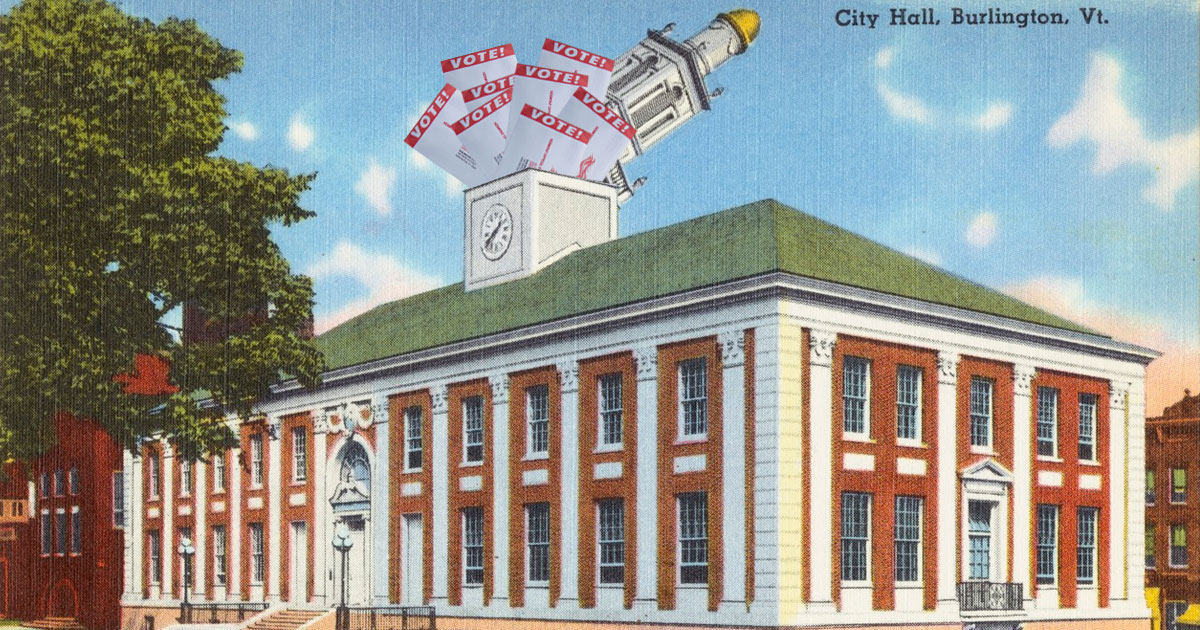Welcome, valued reader, to The Rake Vermont’s 2022 Burlington City Council Election Prospectus. Below you will find a cursory guide to each of Burlington’s wards as currently drawn, sorted by the districts they are grouped into. Each ward has one or several candidates bidding to represent it; accordingly, we have prepared summaries of these current candidates’ backgrounds and known positions as well as their respective ward’s recent history of representation. There will also be a smattering of analysis regarding prior vote breakdowns in said wards, as well as a forecast for each race.
EAST DISTRICT: WARD 1
A significant portion of Ward 1’s footprint is comprised of both official UVM student housing (Trinity and Central Campuses, as well as Jeanne Mance on Pearl Street) and unofficial student housing occupying much of Loomis Street, Henry Street, Fletcher Place, large swaths of Colchester Avenue and Pearl Street, as well as enclaves in neighborhoods abutting South Burlington and Winooski to the Northeast.
Interspersed throughout these are blocks of single-family homes, condos, and less squalid apartment stock. The most expensive varieties reside at the top of North Street and along Mansfield Ave, but also can be found throughout the upper Old North End along Colchester Ave and Grove Street, as well as all along East Ave and its attendant cul-de-sacs. Ward 1 also contains housing towards the lower end of Burlington’s pricing spectrum, but it is mostly confined to the still-industrial-zoned stretches of Riverside Ave.
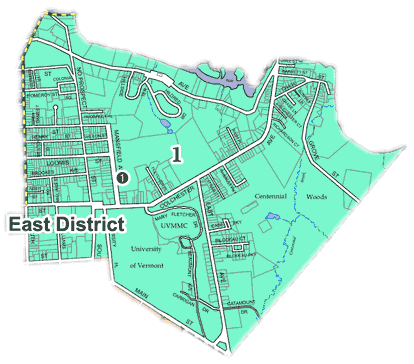
RECENT REPRESENTATION HISTORY
Perhaps due to Ward 1 being a historically student-dominated area – as well as being subject to the property-value depressant effect of containing two of the town’s more congested minor traffic arteries (Riverside and Colchester Avenues) – it has been largely viewed over the past decade as a reliable ward for Progressive and Progressive-affiliated candidates. Sharon Bushor, a Progressive-affiliated Independent, held the seat alongside and prior to Selene Colburn and Zoraya Hightower; Bushor had held a Ward 1 Council seat for over 30 years since first running in 1987. Outside of Bushor, Ward 1 has elected two full-on Progressives to non-consecutive terms: Colburn in 2014, who used the position as a springboard to the State Legislature, and the current incumbent, Hightower, who upset Bushor for the Progressive Nomination in 2019 and then beat her in the general election.
CANDIDATES
Zoraya Hightower
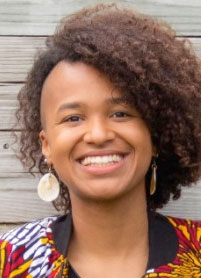 Well before embarking on a career in municipal government, Zoraya Hightower could lay claim to many accomplishments pointing towards a fruitful career in the blurring of lines between public and private sectors. Equipped with a graduate degree from Yale in Environmental and Forestry Studies, Hightower came to Burlington to begin work as a project analyst for Resonance, a Burlington-based for-profit consulting firm, specializing in “international development.”
Well before embarking on a career in municipal government, Zoraya Hightower could lay claim to many accomplishments pointing towards a fruitful career in the blurring of lines between public and private sectors. Equipped with a graduate degree from Yale in Environmental and Forestry Studies, Hightower came to Burlington to begin work as a project analyst for Resonance, a Burlington-based for-profit consulting firm, specializing in “international development.”
Resonance largely does this international development as a contractor for USAID, an independent federal agency established by the Kennedy Administration in 1961 to work closely with the Department of State to, as their website puts it, “use diplomatic and development tools to advance U.S. interests and deliver for all Americans.” Although there is no evidence Resonance has been involved in any such chicanery, it is worth noting that the State Department is not the only government agency that USAID and its contractors have been credibly linked to. It is also worth noting that many of the names on Resonance’s client list have publicly–documented instances of human rights violations.
As for Hightower’s stint in government, it has chiefly been marked by her career achievements outside of it. A year after winning election to City Council, Hightower obtained the sinecure of Executive Director of Burlington’s Peace and Justice Center. In her first term on City Council, the most visible reform project Hightower has hitched her wagon to has been a reinstitution of ranked-choice voting; this was through her custom-created role as co-chair of the NGO VPIRG’s “Better Ballot Burlington Initiative” rather than as a legislator.
Although her votes have mostly been in line with her fellow Progressives on Burlington’s tumultuous police reform process, her public stance on the subject has been largely ambivalent. Take, for example, the extreme qualifying Hightower does prior to her answers in this VPR Interview regarding civilian protests targeting the Burlington Police Department in the wake of George Floyd’s killing (content edited for brevity):
Interviewer: Do you feel like the state and Burlington are making any progress on addressing systemic racism?
Hightower: I think it’s a mixed bag. …
Interviewer: Have you been participating in these most recent protests?
Hightower: I have not as much as I would like, just because city council comes with other responsibilities as well. …
Interviewer: Do you agree with protesters that these three officers should be fired, even if that violates the current union contract?
Hightower: Yes and no, to some extent. …
Interviewer: Do you have more specifics on what that publicly accountable body that you mentioned [referring to Progressives’ statement regarding their legislative intent vis-a-vis police reforms] would look like?
Hightower: I don’t have specifics on what it would look like. I guess I have specifics on what I personally imagine it could look like.
Hightower’s most impactful act of legislation, in fact, may have been not being available to legislate at all. In November 2021, 6 months after leaving Resonance to focus exclusively on Executively Directing the Peace and Justice Center, Hightower was recorded absent at one of the most emotional and tensely-fought city council meetings in recent memory, leading to her Progressive colleagues falling a vote short of forestalling the destruction and disbursement of the Sears Lane independent settlement for otherwise houseless people in Burlington.
From the look of it, Hightower goes into the 2022 race reluctantly, largely due to severe criticism from the public, both in person at council meetings and online – the online portion often crossing the border into harassment (some of it racially-tinged). Without much of a plank to run on or social media fanfare, Hightower’s stated desire with her candidacy is to provide stability and continuity on the council during an election where several sitting councilors have declined to seek re-election.
Rob Gutman
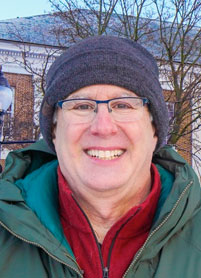 The possessor of an MBA from NYU, a former Ridgfield, Connecticut Realtor (median listing price in Ridgefield: $929,500) and owner of a perhaps-closed side hustle in the Home Inspections biz, Rob Gutman moved to Vermont, or as his campaign website calls it, his “forever home,” sometime after 2016.
The possessor of an MBA from NYU, a former Ridgfield, Connecticut Realtor (median listing price in Ridgefield: $929,500) and owner of a perhaps-closed side hustle in the Home Inspections biz, Rob Gutman moved to Vermont, or as his campaign website calls it, his “forever home,” sometime after 2016.
First alighting in Mad River as a member of Snow Creek Condominium Association (condos here list at approximately $350,000, a pop), Gutman’s neighbors and fellow condo association members numbered among some of Vermont’s finest: David Tanzer, awarded $1.5m by the Vermont Supreme Court in an unprecedented case of corporate intrigue and stock chicanery; Tim Halvorson, Republican owner of Halvorson’s and EB Strong’s in downtown Burlington; and Ken Peters, fellow former member of the Ridgefield, Connecticut business community from which Gutman matriculated, as well as a UVM business school alumni and vice president of “Nexseer Capital,” which acts as a financial services middleman for a really cool private equity fund saddled with legal troubles related to a rent-to-own scheme.
In 2019 Rob purchased a $559,100 property in the heart of Burlington, further cementing Vermont as his “forever home.” It is unclear what Rob has been up to during the 3 years between moving to Burlington and running for city council other than (per his website) volunteering with Habitat for Humanity; however, given his former occupation, the Mad River milieu which with he associated, and his campaign website’s preoccupation with Burlington’s housing market and coding, one might guess what his future plans hold.
FORECAST
Zoraya takes the seat easily, most likely by double digits.
EAST DISTRICT: WARD 8
The other half of Burlington’s East District, Ward 8 was gerrymandered into existence in 2015 as a reaction to concerns about a growing imbalance of student voters in Ward 1. Redistricting resulted in segregating the bulk of UVM’s student housing and the most egregious of the student slums in their own ward, leaving student growth throughout Burlington’s Old North End unaddressed. As a result, Ward 1 still has a hefty student voter presence and Ward 8 is almost exclusively populated by the UVM student body; in its seven years of existence Ward 8 has exclusively sent a current or just-graduated UVM student to City Council.
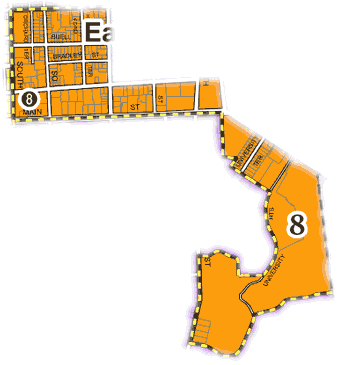
Far be it from The Rake to question the sagacity of city officials, but this is certainly an interesting result for a process facially intended to redress the burgeoning disempowerment of local residents at the hands of the University.
REPRESENTATION HISTORY
Ward 8 sees itself at a crossroads. It has only existed for 7 years, and seen exactly 3 elections leading up to this one. In its inaugural city council election, Adam Roof (a member of the UVM Board of Trustees at the time, now chair of the Burlington Democratic Party and no stranger to The Rake) defeated fellow Democrat Brock Gibian. Roof then won re-election in 2018 over Progressive Carter Neubieser, Jr. In each election, less than 1,000 votes were counted. In 2020, when turnout went above the 1,000 vote mark, Roof lost his third council bid to Progressive Jane Stromberg, whose term over the past two years has been largely marked by frustrated idealism; frustrated (by the Mayor and by highly vocal opprobrium to current City Council inaction) to the point where Stromberg has now declared herself not up for reelection.
CANDIDATES
Hannah King
 Already an Emerge alumni (finishing school for aspiring Democratic female politicians) and a staffer on multiple city council campaigns, Hannah King, hailing from Massachusetts and a current UVM Senior, boasts an eyebrow-raising number of insider-politics merits for somebody both young and new to the Burlington area as she is.
Already an Emerge alumni (finishing school for aspiring Democratic female politicians) and a staffer on multiple city council campaigns, Hannah King, hailing from Massachusetts and a current UVM Senior, boasts an eyebrow-raising number of insider-politics merits for somebody both young and new to the Burlington area as she is.
Announcing her run well ahead of the field in November of 2021, King is at the vanguard of the Burlington Democratic Party as an Emerge participant and college Democrat she literally represents the party’s future. Given this, the few vague policy priorities she has committed to via her campaign website seem to hint at a slightly more rhetorically Progressive bent than her older Democratic peers (no other Democrat has positively mentioned rent stabilization, a minimum wage hike, or the need to decouple police from front-line mental health responses). King is also an of-the-moment spearhead for the Burlington Democratic Party; the nascent Ward 8 has yet to prove a reliable get for either of Burlington’s major parties, and cementing a legacy of control over his former seat in its first decade is certainly something Adam Roof and other Burlington Democrats have their hopes pinned on.
Speaking of Roof – King is a protege of his, currently as a board member for BTV FWD, his policy advocacy group, and formerly as Roof’s campaign manager in his failed third bid for the Ward 8 seat. King also worked for local landlord and former Progressive Tiki Archambault in his failed, quixotic attempt to unseat sitting Councilor Perri Freeman (most known in their tenure as a councilor for being the principal actor in the City Council’s attempts to enact police reform). As though the karmic payloads one acquires through such intense exposure to the Burlington Democratic party weren’t enough, King also served as an intern with the Burlington Chamber of Commerce.
Ali House
 Also a UVM Senior from New England (New Hampshire in this case), Ali House is the other, more Progressive, less business-adjacent side of the coin to King’s Democratic up-and-comer profile. Where King has spent her time becoming entrenched in and acquainted with local party politics, House has briefly interned at the Vermont Statehouse and local NGO Lund Family Center. Where King has trumpeted general policy intentions on a well-branded website, House has quietly posted her multiple-paragraph policy positions to a Twitter thread with a cumulative 7 likes.
Also a UVM Senior from New England (New Hampshire in this case), Ali House is the other, more Progressive, less business-adjacent side of the coin to King’s Democratic up-and-comer profile. Where King has spent her time becoming entrenched in and acquainted with local party politics, House has briefly interned at the Vermont Statehouse and local NGO Lund Family Center. Where King has trumpeted general policy intentions on a well-branded website, House has quietly posted her multiple-paragraph policy positions to a Twitter thread with a cumulative 7 likes.
Given her relative lack of eager participation in the great public project that is earning goodwill with the grandees of the local Democratic Party, House’s background is less storied than her opposition; however lacking in press releases her work the last year may have been, it is worth noting that House has spent said year in the employ of Colchester School District as an educator and social worker, providing her a perspective that is increasingly uncommon to municipal government.
FORECAST
Given that without a national election to bolster turnout, and low turnout often favoring the more regressive and aggressive candidates, I’d expect to see low turnout in the ward that’s known for it, with King (who announced earlier than House, led a more aggressive media campaign, and as a Democrat by default runs to the right of House despite the eerie similarity in their vague campaign bromides) taking it due to favorable conditions. Based purely on vibes, the most powerful predictor of political outcome, the author would also think that King wins this by a comfortable but small margin.
CENTRAL DISTRICT: WARD 2
Covering the rapidly-gentrifying portions of the Old North End without significant industrial zoning, Ward 2 still retains pockets of college students but is predominantly residents living in rentals and what were, two decades ago, affordable single-family homes. There is still some subsidized housing here, and a decent amount of Burlington’s immigrant community can be found in Ward 2.
An already densely-built neighborhood, in recent years a lack of large lots to develop on coupled with intense real estate speculation has turned Ward 2 into a vice; the community is squeezed between intense upward real estate pressure and a fairly hard ceiling on development potential. As a result, this area has seen a rise in short-term rental units as well as a notable lack of population growth in Burlington’s more spacious neighborhoods.
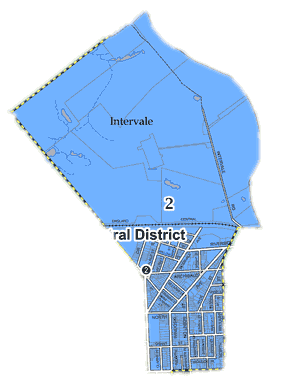
REPRESENTATION HISTORY
At the beginning of the 2010’s, Ward 2’s long standing reputation as a leftist bastion looked as though it might finally have been shattered, as Democrats Bram Kranichfeld and David Berezniak seized its then-two City Council seats by shockingly-slim margins (14 and 10 votes, respectively). Three years later, longtime Progressive City Councilor Jane Knodell (holder of a council seat since 1993) re-emerged from her recently-resigned position as UVM’s Provost – the reason one of the seats had been in play in 2010 to begin with – and crushed her opposition. This paved the way for Max Tracy, who lost by the aforementioned 14 votes in 2010, to steamroll the Democrat standing in the way to his City Council seat a year later in 2014. Since redistricting, Tracy has comfortably held the Ward 2 seat until now, when, citing burnout, he has recused himself from this year’s race.
THE CANDIDATES
Gene Bergman
 The sole candidate in the staunchly-Progressive Ward 2, Gene Bergman is something of a curiosity to current Burlington politics: he has extensive local bona fides, having settled here in the early 1970s (no other current city councilor has lived in Burlington this long) and serving as one of the original wave of Burlington Progressives on City Council alongside former mayor Bernie Sanders from 1986 to 1992.
The sole candidate in the staunchly-Progressive Ward 2, Gene Bergman is something of a curiosity to current Burlington politics: he has extensive local bona fides, having settled here in the early 1970s (no other current city councilor has lived in Burlington this long) and serving as one of the original wave of Burlington Progressives on City Council alongside former mayor Bernie Sanders from 1986 to 1992.
Bergman’s bona fides as a leftist are similarly well-established and part of Burlington’s past; as a UVM student he participated in the occupation of the campus ROTC building and was later arrested for blocking the entrance to a federal building during a protest. Bergman was also instrumental in Burlington’s initial wave of co-op and mutual aid organizations, starting a co-op for the collection and distribution of canned goods that eventually dissociated into a large and vibrant network of local co-ops, many of which we know today – eventually, this network of food co-ops would form into City Market.
This, as a metaphor for the development of Burlington from the 70s onward, is fairly apt. The portrait Bergman’s work since his first go-round on City Council paints is one quite similar to that of the Progressive cause in Burlington in the same timespan: Bergman served as City Attorney for two decades under increasingly-gormless mayors, first Pete Clavelle, then Peter Brownell, Clavelle again, Bob Kiss, and Miro Weinberger. In 2018 Bergman retired as City Attorney, having again sought public office once in 2012 and getting summarily obliterated by Democrats Jill Krowinski and Kurt McCormack in that year’s race for State Representative.
There is the temptation to ascribe a touch of Arthurian character to Bergman, who spent several decades on the Isle of Avalon of City Attorneyship – and even longer from principal participation in a once-promising and radical Progressive Party – and who now returns to assume the mantle of a position of significance in what looks to be the party’s darkest hour. This would, however, be wrong. Gene Bergman is just a guy running for City Council.
FORECAST
There’s only one person up for election: Gene Bergman. Therefore, there is very little reason to believe that he will not win. That having been said, since Gene is running, at least a few people might get confused, think it’s the 90’s again, and write in Jane Knodell.
CENTRAL DISTRICT: WARD 3
Ward 3 further cordons apart Burlington’s Old North End and combines it with downtown Burlington, the most downtown-proximal bits of Burlington’s South End, and all of the immediate downtown area’s lakefront properties. As one might expect, the residential properties closest to Burlington’s “urban core” tend to be quite expensive while the properties without lake views which experience traffic runoff, street noise, and drunken antics as a result of proximity to Church Street tend to be less so.
There is a fair amount of socioeconomic diversity present in Ward 3; as in all of Burlington’s wards, however, it has trended “upwards” in the last few decades. This is due in part to upwards pressure on existing real estate through a sharp rise in speculation, but also to the steady development of Burlington’s lakefront as well as marked development in the formerly-seedy areas directly to the south of Church Street.
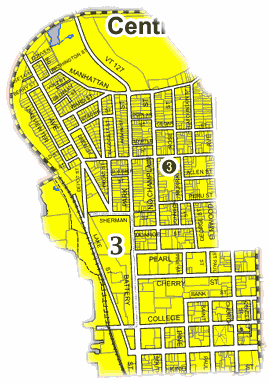
REPRESENTATION HISTORY
Ward 3 has been the staunchest possible Progressive stronghold over the last decade.
As proof, here is a list of every Ward 3 City Councilor to win office since 2010: Emma Mulvaney-Stanak (Progressive), Vince Brennan (Progressive), Rachel Siegel (Progressive), Sara Giannoni (Progressive), Brian Pine (Progressive… regrettably), Joe Magee (Progressive). You may have noticed all these councilors have one thing in common, besides being white. All Progressive.
CANDIDATES
Joe Magee
 In many ways, Joe Magee is the typical Burlington politician, having completed a degree from the UVM School of Business and a tour of duty with a state-level lobbying firm. In others, Magee has proven himself to be something of an outlier amongst his milieu, displaying the will to simultaneously draft legislation, show up to City Council meetings, and – while at them – push back against Democratic opponents.
In many ways, Joe Magee is the typical Burlington politician, having completed a degree from the UVM School of Business and a tour of duty with a state-level lobbying firm. In others, Magee has proven himself to be something of an outlier amongst his milieu, displaying the will to simultaneously draft legislation, show up to City Council meetings, and – while at them – push back against Democratic opponents.
While running his second election campaign in as many years, Joe Magee has found time to author several resolutions regarding Burlington’s housing crisis with predictably mixed results (Magee’s resolution to defend Burlington’s houseless population was combated vigorously and ultimately defeated by council Democrats, while his resolution to reassess Burlington homeowners’ property tax burdens has been championed by the media and his peers).
The mixture of UVM and statehouse pedigrees with his unusually high level of legislative activity marks Magee as a potential rising star in the Progressive Party; while it remains to be seen if he can sustain these levels of energy over a full two-year term, if elected Magee seems especially poised to assume the role of the vocal left flank of Burlington’s City Council as his colleagues succumb to fatigue and chagrin at the triple threats of a hostile mayor’s office, Democratic resistance on the council, and burgeoning public dismay and vitriol.
The Loathsome Christopher-Aaron Felker
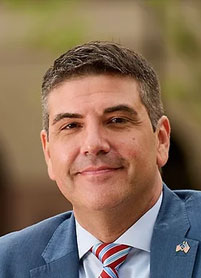 What can be said of Christopher-Aaron Felker that hasn’t been said already? Plenty, probably, but as The Rake’s editorial practices forbid the sort of invective which the author believes Felker so richly deserves, his greatest hits will have to suffice: a former “electronic warfare technician” for the United States Navy, proud Republican, and openly gay man, Felker has – since decisively losing his tilt against Joe Magee for the Ward 3 Council seat in last year’s special election – made his presence known by loudly demanding increased police presence across Burlington at what feels like every single City Council public comment section.
What can be said of Christopher-Aaron Felker that hasn’t been said already? Plenty, probably, but as The Rake’s editorial practices forbid the sort of invective which the author believes Felker so richly deserves, his greatest hits will have to suffice: a former “electronic warfare technician” for the United States Navy, proud Republican, and openly gay man, Felker has – since decisively losing his tilt against Joe Magee for the Ward 3 Council seat in last year’s special election – made his presence known by loudly demanding increased police presence across Burlington at what feels like every single City Council public comment section.
Distasteful as some may find Felker’s current primary concern for the robust policing of his fellow Burlingtonians, it is no more disasteful than his former primary concern for the robust policing of his fellow humans’ gender on the internet in wildly transphobic social media screeds.
FORECAST
In a Progressive stronghold, running against one of the most repugnant local candidates in recent memory, Magee ought to win this by a mile.
NORTH DISTRICT: WARD 4
Containing all of Burlington’s New North End between North Avenue and Lake Champlain, Ward 4 has all the hallmarks of an affluent suburban haven for the well-off: several public beaches, even more private beaches, stunning lakefront views, proximity to two elementary schools and a middle school (conveniently stowed across North Ave in Ward 7), the bulk of Burlington’s bike path, an ice skating rink, and a well-developed shopping complex.
Much of Ward 4’s affordable rental stock has been developed into higher-end apartments and condos, most notably the former Burlington College Campus, although Northgate Road remains a small bubble of mostly cooperative housing due to the depressive effects of being located directly next to the Elderwood nursing home.
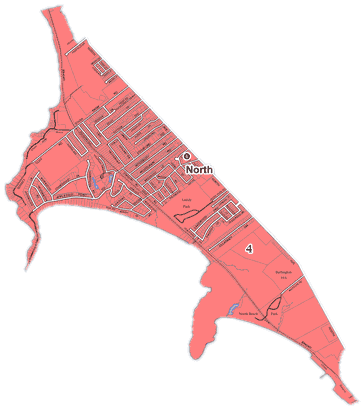
REPRESENTATION HISTORY
The combination of a small flurry of recent development as well as the sharp rise in housing prices in the Old North and South Ends has led Ward 4 to become the largest seat of voter turnout in Burlington for much of the last decade-plus. Until recently, Ward 4 had been a conservative stronghold; Ward 4 was possessed of the singularly distasteful characteristic of consistently electing Burlington’s most recent Republican City Councilor, Kurt Wright. Wright had served as one of Ward 4’s Councilors from 1993 to 2020, announcing his retirement from politics following a disastrous 2018 bid for reelection to the State Legislature. In 2020, after the departures of Wright and less-partisan Democrat Dave Hartnett, Ward 4 went Democrat by an extremely comfortable margin.
CANDIDATES
Sarah Carpenter
 One of several recent and current Burlington politicos or city officials with a Harvard degree, Sarah Carpenter may be the Burlington Democratic Party’s latest addition to City Council, but she’s been hanging around many of Burlington’s municipal institutions for quite some time. Like many of her fellow council members and candidates, Carpenter has served in numerous board or executive positions regarding the administration of resources in Burlington and Vermont.
One of several recent and current Burlington politicos or city officials with a Harvard degree, Sarah Carpenter may be the Burlington Democratic Party’s latest addition to City Council, but she’s been hanging around many of Burlington’s municipal institutions for quite some time. Like many of her fellow council members and candidates, Carpenter has served in numerous board or executive positions regarding the administration of resources in Burlington and Vermont.
Carpenter’s specialization in these fields? Housing, of course. Having presided over housing initiatives as an executive or board chair at Cathedral Square, the Vermont Housing Finance Agency, and the Vermont Rental Housing Advisory Board spanning from 1983 to the present day, Carpenter has been an instrumental figure in the development of Vermont’s housing market and a key player in its continued refinement of the “private-public partnership” model that has so successfully led to its current state.
As current council candidates in more contested races continue to call for increased concentration on housing concerns, it’s comforting to know that they will be, when confirmed victors, in concert with Carpenter.
FORECAST
Sarah Carpenter is the sole person seeking election in Ward 4, there being precious few Progressives in this godforsaken ward and even fewer electable Republicans. She’s winning.
NORTH DISTRICT: WARD 7
Simply put, Ward 7 is the New North End’s “wrong side of the tracks,” the “tracks” in question being North Ave. Almost entirely enveloped by major traffic arteries (North Ave on one side, VT-127 on the other), Ward 7 contains the New North End’s industrial and public areas – much of the still-affordable single-family and rental units in Burlington can be found here, often directly by a school, a small park, protected wetlands, or (if you’re lucky) the Ethan Allen Homestead and its museum. Ward 7 has seen significantly less development than its neighbors to the South and West.
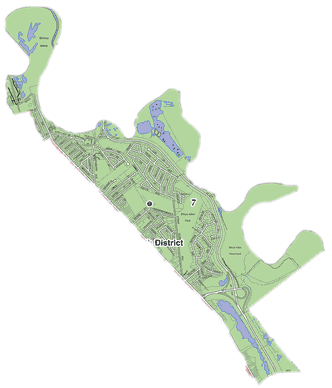
REPRESENTATION HISTORY
Much like its neighbor across North Avenue, Ward 7 was until fairly recently a reliable bet to send a Republican to City Council. In 2013 and 2014, Democrats Tom Ayres and Bianka Legrand narrowly captured seats, and unlike their narrow victories’ reversals in Ward 2, Democrats held on for one more election cycle, electing Ayres by a slim margin again in 2015 after redistricting. Ayres lasted 2 years before resigning his position to move to Randolph, necessitating a special election for his replacement. Ali Dieng, a New American Burlington School District outreach coordinator, won the Democratic nomination as a Democrat/Progressive candidate, garnering endorsements by Mayor Miro Weinberger and Bernie Sanders – among others – and matter-of-factly squashed his Republican opponent to win the seat, which he then defended easily in 2020 as an Independent.
CANDIDATES
Ali Dieng
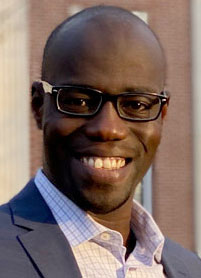 From his initial election in 2017 and his handy reelection in 2020 up until early 2021, Ali Dieng’s political capital seemed to be snowballing. Although fractures in his relationship with the local Democratic party were beginning to grow, Dieng was undeniably popular in the once-deeply regressive Ward 7 and unscathed by the ongoing controversies surrounding Burlington’s CityPlace development and Police Department. Promising a nonpartisan, measured approach to governance, the Independent politician announced his candidacy for Burlington’s mayorship, at which point the wheels completely fell off.
From his initial election in 2017 and his handy reelection in 2020 up until early 2021, Ali Dieng’s political capital seemed to be snowballing. Although fractures in his relationship with the local Democratic party were beginning to grow, Dieng was undeniably popular in the once-deeply regressive Ward 7 and unscathed by the ongoing controversies surrounding Burlington’s CityPlace development and Police Department. Promising a nonpartisan, measured approach to governance, the Independent politician announced his candidacy for Burlington’s mayorship, at which point the wheels completely fell off.
During the mayoral campaign, what had once been murmurs of disgruntlement with Dieng’s apparent lack of ideological loyalty to either of Burlington’s major parties became – if not roars – unmistakable signs of his inability to form a viable political coalition of moderate Democrats and Progressives. When the dust had settled and the votes were counted, Dieng had failed to secure a plurality of votes in his home Ward, 7, and faced mounting criticism from council Democrats for his opposition of the Weinberger administration’s projects as well as his refusal to vote in lockstep with them on outright denial of Progressive plans for police reform. Another notable stumble of Dieng’s: bringing forth, then immediately withdrawing a resolution to recognize the rights of Palestinians at the first sign of public pressure.
Perhaps chastened by this, Dieng has since softened his stance on police reform and become a booster for business development in Burlington’s foundling technology sector. Additionally, he has redoubled his efforts to retain Ward 7’s affections, ushering the construction of a small local library on North Avenue and seizing every opportunity available for public appearance. Despite having stated his indecision over running for reelection, Dieng has very much made an indelible mark on Ward 7’s electoral history and does not appear to be ready to surrender his seat representing it.
Aleczander Stith
 A plant manager and senior engineer for Teknor Apex, a plastics manufacturing company with multiple environmental violations on record, and one of several Democratic candidates running for City Council on a platform of non-ideological pragmatism and civility (talking points universally adopted by local Democratic candidates over the last two election cycles), Aleczander Stith’s primary intrigue comes not from his policy plank or his public persona but as an avatar of several shifts in the fault lines of Burlington politics.
A plant manager and senior engineer for Teknor Apex, a plastics manufacturing company with multiple environmental violations on record, and one of several Democratic candidates running for City Council on a platform of non-ideological pragmatism and civility (talking points universally adopted by local Democratic candidates over the last two election cycles), Aleczander Stith’s primary intrigue comes not from his policy plank or his public persona but as an avatar of several shifts in the fault lines of Burlington politics.
Stith has been endorsed by both the Burlington Democratic and Republican parties, representing the clearest signal yet of the Burlington Democratic establishment’s warming attitudes toward the reactionary and libertarian types that in decades prior they would have had little use for. Stith, for his part, has courted the still-very-extant Republican vote in Ward 7, appearing on local right-wing crank Ericka Redic’s internet TV show to throw a little red meat to her viewers in the form of statements such as:
“Public safety is very important, and it’s on the forefront of a lot of people’s minds, myself included…. The way that the public safety initiative for cutting the police through attrition went down, I do not believe that that is the right way, I think a lot of people see that it was not the right way to go; and, if you think about it, the plan should have been in place for refunding, if you’re going to defund, long before the defunding cord was pulled on that.”
Similarly, Stith’s campaign drew controversy by attracting the rare Burlington Police Officers Association endorsement despite offering no functional difference in proposed policing policy from that of his opponent Ali Dieng’s campaign. This being the same Burlington Police Officers Association whose president is currently on the receiving end of a police brutality lawsuit involving a person of color, the value of this endorsement is dubious at best; however, it is useful in assessing the character of Stith’s run for council.
It is highly unlikely Stith’s voting record on City Council will differ meaningfully from Dieng’s, but his run is a sign that Burlington Democrats can no longer tolerate the possibility of a seat they potentially do not control; further, that their lack of tolerance has reached the extent that it is at the pain of making their dalliance with dog-whistle “law and order” politics public and explicit.
Olivia Taylor
The rare New North End Progressive candidate, Olivia Taylor is something of a cipher politically. A UVM Honors College graduate originally hailing from the Stamford, Connecticut area, Taylor’s political involvement seems to be scant relative to the rest of the field of candidates.
One thread of political connection for Taylor is that until recently, she shared a workplace with sitting Progressive City Councilor Zoraya Hightower in Resonance, a global development firm and contractor for the U.S. State Department (for the second time in these previews, it will be pointed out that global development firms such as Resonance have a somewhat controversial history, as well as that Resonance’s client list contains many publicly–documented violators of human rights).
Elsewhere, Taylor’s campaign media and history provide few clues as to the political underpinnings to her run. Parallel to graduating from UVM she interned at the Vermont Transportation Agency, possibly to shore up her undergraduate thesis, which makes the useful observation that Vermont sees positive correlation between gas prices and public transit ridership in Chittenden County, its most urban area, but not in most of its rural areas.
In the press she has received Taylor has stated that “she wants to advocate for a new tax credit for landlords who rent to tenants on a long-term basis, with the goal of discouraging evictions.” as well as for “the city to create a business development specialist position that would ‘provide free support’ to businesses owned by woman and Black, Indigenous and people of color,” which, when taken together, indicate a rather moderate pragmatist of a candidate who would prefer fellow Progressives move toward the center away from their recent activist streak.
Esoteric, but of note: Rake Contributor Alexandra Smith noticed that the Taylor campaign’s fundraising efforts are largely buoyed by a single $3,000 donation from a “Michael Kamins” of Taylor’s hometown, Stamford, Connecticut. Upon a little further digging, the same Michael Kamins is registered as the principal of an “FC Retail, LLC,” whose listed address directs to this bizarre Google Maps Listing.
FORECAST
Dieng, despite his mayoral race missteps, has achieved much of what he ran on in 2017 and again in 2020 and is generally well-liked in Ward 7; it would be surprising if he didn’t win this year.
SOUTH DISTRICT: WARD 5
A former arts, heavy industry, and public works area, the larger of the South District’s two wards is in many ways a continuation of the New North End’s Ward 4 – private and public beaches, proximity to several (private) schools, large amounts of expensive single-family homes and high-end lakefront properties, shopping amenities of its own, and access (but limited exposure) to a well-trafficked thoroughfare highlight their similarities.
Ward 5 differs from 4 with a wealth of formerly industrial space across various phases of the development process, all trending towards tech campuses (Dealer.com, Hula) and higher-end commercial properties (Burlington Beer Company, Dedalus, Zero Gravity). Ward 5 is also insulated from the negative effects of exposure to automobile traffic, the extent of its exposure VT-7 being low of speed limit and bountiful in traffic lights.
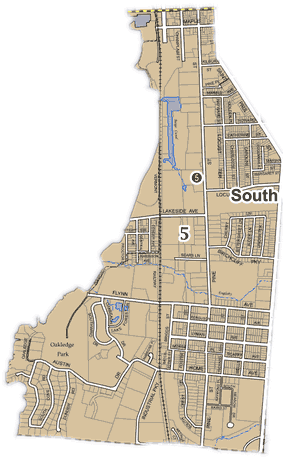
REPRESENTATION HISTORY
Ward 5 may have once been a bohemian arts district favoring left-of-center politicians, but by 2010 that was decidedly in the rearview mirror, looking none too close. Ward 5 has elected a Democrat every election this past decade, its representatives the last ten years being vehemently pro-police grifter/realtor Joan Shannon (currently the sitting South District councilor) and her close political ally William “Chip” Mason IV, a corporate-interest lawyer specializing in representing private equity firms (if that doesn’t ring alarm bells, may we suggest some light reading). Mason is calling it quits this election, which means a whole new slate of candidates.
CANDIDATES
Ben Traverse
 If the timing of a City Council candidate’s announcement of intent to run is a bellwether of their party’s enthusiasm for them, the Burlington Democratic Party is brimming with enthusiasm for Ben Traverse. Another mark of enthusiasm: Traverse has received over $15,000 since his campaign launched in the early days of December, $6,000 of which have come from out-of-state donors.
If the timing of a City Council candidate’s announcement of intent to run is a bellwether of their party’s enthusiasm for them, the Burlington Democratic Party is brimming with enthusiasm for Ben Traverse. Another mark of enthusiasm: Traverse has received over $15,000 since his campaign launched in the early days of December, $6,000 of which have come from out-of-state donors.
Perhaps some of this enthusiasm is out of fear that City Council would be particularly bereft if deprived of a lawyer numbering among its members – Traverse’s election would ensure the legal profession’s continued representation on the council; perhaps, however, Traverse’s particular expertise is a driving factor among his $15,000 worth of supporters. Traverse is primarily a labor attorney at Downs Rachlin Martin, a law firm whose director of labor and employment law, Peter Robb, was Donald Trump’s appointee as general counsel to the National Labor Relations Board (NLRB). This together with the multiple articles about Robb’s swift firing after Trump’s departure, as well as how widely loathed Robb was at the NLRB, help signal Ben Traverse’s stance on labor rights.
If you thought that maybe Traverse avoided some of the worst politics of his employer, just take a look at some cases he worked on for Downs Rachlin Martin: they involved greasing the wheels on an eviction (the husband of his lead attorney on this case physically assaulted a high school student, only for deputy state’s attorney and former Democratic Burlington City Councilor Franklin Paulino to dismiss charges without retrial) and litigating against the whistleblower in the State of Vermont’s disastrous OneCare scandal (Trump appointee for U.S. State’s Attorney at the time and current Republican candidate for U.S. Congress, Christina Nolan, declined to pursue the case).
Traverse also worked as an in-house lawyer for the New York Police Department. Using his labor law expertise there, Traverse worked on behalf of the NYPD in cases such as one in which he helped the department defend itself in a wrongful termination suit against a South Jamaica, Queens officer who alleged that he had been wrongly terminated in retaliation for recording his superiors’ demand that he illegally fulfill summons quotas.
Traverse is vocally anti-police reform and quiet on pro-worker initiatives such as minimum wage or rent protection. Outside of his intense respect and admiration for law enforcement, Traverse’s campaign has spent time making noise about Burlington’s housing issues – issues Traverse, as a member of his neighborhood planning committee and the Burlington Housing Board of Review, would be quite familiar with. For those unfamiliar, the Housing Board of Review’s chief function is settling security deposit disputes (more often than not in the favor of landlords), review exceptions to housing code (more often than not in the favor of landlords), and review appeals to municipal orders regarding housing (more often than not in the favor of landlords; except, of course, when involving fire safety. Unrelatedly, the Burlington property which experienced multiple fires in 13 months due to code violations is in Ward 5, Traverse’s ward).
Also of note with Traverse: he is, as a matter of public record, a Texting While Driving Guy.
FaRied Munarsyah
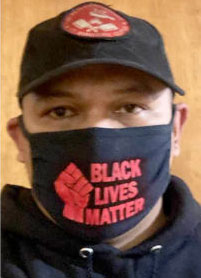 A Progressive candidate running against a deep-pocketed Democrat in the deeply Democratic Ward 5, if FaRied Munarsyah were not a stranger to lost causes before this election cycle he certainly is now. Munarsyah has been involved in the Vermont Workers Center, Burlington Tenants Union, Sears Lane Coalition, and The People’s Kitchen for many years now, and will likely continue that work regardless of election outcomes. Given Munarsyah’s history of community and political activism in Burlington over the last several years, losing a City Council race looks to be far less Sisyphean in comparison.
A Progressive candidate running against a deep-pocketed Democrat in the deeply Democratic Ward 5, if FaRied Munarsyah were not a stranger to lost causes before this election cycle he certainly is now. Munarsyah has been involved in the Vermont Workers Center, Burlington Tenants Union, Sears Lane Coalition, and The People’s Kitchen for many years now, and will likely continue that work regardless of election outcomes. Given Munarsyah’s history of community and political activism in Burlington over the last several years, losing a City Council race looks to be far less Sisyphean in comparison.
Munarsyah whet his appetite for electoral jousting managing fellow community organizer Infinite Culcleasure’s failed mayoral campaign in 2017; this may not strengthen his bona fides as a winner but does brand him with certain inclinations attractive to certain local Progressives to whom results are immaterial as long as one has made the most virtuous choices.
While there are several City Council candidates who have spent the time, money, and effort to manicure their political inclinations into anodyne ‘about me’ sections of their campaign pages, there is only one candidate (to the author’s knowledge) who has an extensive Seven Days comment history to peruse. This candidate? FaRied Munarsyah.
Lenora Travis
 The last of all candidates to announce their run and least politically-experienced, Independent Lenora Travis has the highest hurdles to clear in her bid for City Council. Clearing significant hurdles, however, is a concept central to her candidacy: Travis moved to the Burlington area from North Carolina with one of her sons and immediately found herself without housing due to mishaps in her prospective arrangements.
The last of all candidates to announce their run and least politically-experienced, Independent Lenora Travis has the highest hurdles to clear in her bid for City Council. Clearing significant hurdles, however, is a concept central to her candidacy: Travis moved to the Burlington area from North Carolina with one of her sons and immediately found herself without housing due to mishaps in her prospective arrangements.
Travis has since found housing, luckily, but the experience was formative: having seen her own community’s response to those without housing during the Sears Lane fiasco in concert with a less-than-ideal response from City Hall or its council chambers, Travis decided to run herself.
It is less clear what Travis’ methodology will be towards effecting her stated goals of increasing housing security and strengthening local businesses. While she has often cited these as her most pressing issues alongside making statements such as, “I want the racial justice… you know, the progressive types, voted out” (at a candidate forum on February 2nd), she has not demonstrated a reliable path toward those goals as much as she has demonstrated her strength of conviction that they are important.
FORECAST
Ben Traverse takes the seat, keeping Ward 5’s decade-long tradition of sending one of the most evil persons possible to City Council alive and well.
SOUTH DISTRICT: WARD 6
While there are a surfeit of rental properties in the parts of Ward 6 close to downtown, which are indistinguishable from those in the nicer parts of Wards 1 through 3 – as well as many charming overpriced single-family residences similar to those you’d see in the suburbs of Wards 4 and 5 – what sets Ward 6 apart is its concatenation of very large, very expensive single-family dwellings through its steeper middle reaches (dubbed “the hill section,” due to being on a hill).
Ward 6 is also spiritually home to one of Vermont’s most expensive private schools, Rice Memorial (annual tuition and fees as of writing: $12,425), tucked mere feet away from Ward 6’s border, just across city lines in South Burlington.
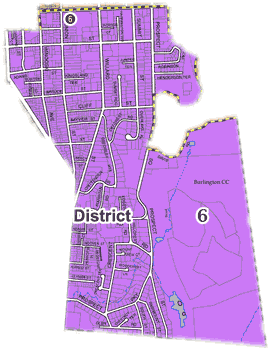
REPRESENTATION HISTORY
Nothing to see here. Ward 6, like 5, has been incredibly consistent in sending petit-bourgeois Democrats to City Council over the past decade-plus. The incumbent, Karen Paul, has been in office since 2008, and was joined by other Democrats in the 7 years prior to Ward 6 losing its second councilor to redistricting.
CANDIDATES
Karen Paul
Alongside the more-heralded Joan Shannon, Karen Paul has proven one of the Burlington Democrats’ most stalwart sitting councilors. The 14-year council veteran and CPA has all the hallmarks of a well-entrenched Burlington Democrat: a large number of board memberships, a reactionary voting history, and involvement in several high-profile governmental pecuniary fiascoes.
Those fiascoes, in particular: first, her tenure as a board member of the Vermont Pension Investment Commission from 2011 to 2019 coincided with disastrously egregious underperformance for the state pension fund, jeopardizing the retirements of tens of thousands of state employees. Second, her dramatic eleventh-hour immediate resignation from the accounting firm of McSoley McCoy & Co, whose employ she claimed represented an undisclosed conflict of interest in her vote on the privatization of the then-public utility Burlington Telecom. Without her job and the mysterious conflict of interest, Paul proceeded to cast the deciding vote in favor of privatization.
Paul’s current status as a member of Emerge VT keeps her plugged into the beating pulse of Vermont’s recent strong spate of female Democratic political figures; given the length of her unwavering dedication to a political organization which favors seniority and loyalty above all else it would hardly raise an eyebrow were Paul to announce a run for state representative or some such higher office at the appropriate juncture. This year is not that juncture.
FORECAST
Another easy race to call. One small step for Karen in Burlington, one gigantic leap for Karens everywhere.
CORRECTION: Councilor Hightower’s former employer, Resonance, is a for-profit consulting firm, not an NGO. The story has been updated.
Cocktail Hell is a nameless service industry professional in Vermont.

